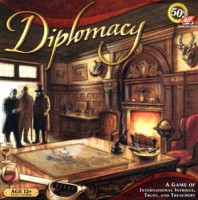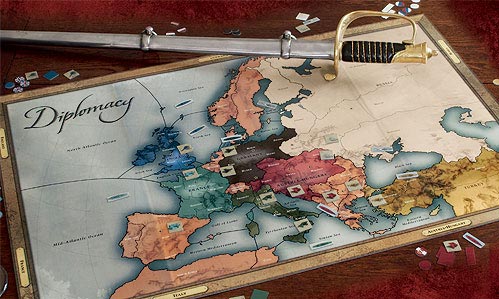
Diplomacy
2-7
12+
300+

The Classic Game of Intrigue, Trust, and Treachery!
At the turn of the 20th century, the seven Great European Powers engage in an intricate struggle for supremacy. Military forces invade and withdraw, shifting borders and altering empires with subtle maneuvers and daring gambits.
Form alliances and unhatch your traitorous plots as you negotiate and outwit—in a delicate balance of cooperation and competition—to gain dominance of the continent! In Diplomacy, your success hinges not on the luck of the dice, but your cunning and cleverness.

images © Wizards of the Coast
User Reviews (5)
Add a Review for "Diplomacy"
You must be logged in to add a review.


I have been playing Diplomacy for over 3 decades. It never gets old. I love the game so much, I watch videos on how to improve my playing whenever I find one. The game is best played by the full 7 (or 8 if you have someone run the game) players. Each of the 7 players takes control of one of the European powers in the early 1900s – England, France, Germany, Italy, Austria-Hungary, Russia, and Turkey – and tries to control specific supply centers. The game is fairly simple to learn, but hard to master. There are only 2 different game pieces – armies and navies. Each piece can move on space each turn (spaces are regions or countries as opposed to hexes) or support another pieces move. Combat is simply one piece moving into the space that an opposing country controls or is also moving in to. No dice are rolled. If I move in and is supported by one other piece, and you move in with no support, I win (2 to 1). Navies can also help armies move across water. All movement is done at the same time by writing down your orders.
The most interesting aspects of the game, and the parts of the game that makes it difficult to master, is that countries can support each and then stab each other in the back. Prior to writing down your orders, there is a diplomacy phase (hence the name) where players can meet (in secret by going to another room or corner) and discuss strategy. Even if you promise to support someone, you do not have to. But, stabbing someone in the back will probably make them a game-long enemy, so choose those very carefully.
Most people who play the game a lot, know that some countries are more difficult to play or have a favorite country and this usually results in a big advantage as serious gamers do spent a lot of time between games researching strategies. But, “bidding” for countries at the beginning at least gives other players a chance to force that person to take a less desirable starting location.
Does not play well with fewer than 4 players, but does play well with 4 to 6 if you cannot get 7.
Overall, one of the most interesting, intriguing “wargames” out there. It is also one of the originals and has withstood the test of times. Plus, there are tons of reviews, game plays, and strategy hints out there. This makes the game one of those truly rare games that are great to play and also fun to research while planning your next game.
I should start by saying this is a great game. My rating was made based on a very limited group of players that makes the game frustrating for me in particular. In addition, I wasn’t aware that game ratings couldn’t be changed.
But there are three things that you might want to know going into this game, to compare against those with whom you’ll be playing this game.
1. This game requires alliances. Teamwork is mandatory for this game, and you can’t get around it. A single player simply cannot win. So playing against a group of people who always team up (excluding you) is likely to make your game very negative.
2. This game requires betrayal. An integral part of the game is betraying someone before they betray you, hopefully to your benefit. If you play with people that hold grudges, or who don’t like this mechanic, you might not have as much fun.
3. This game requires experience. This is less about being an expert as it is about everybody being about the same experience level. If everybody is a novice, or everybody has won Diplomacy tournaments, you’re going to have a great game. But it’s the kind of game where experts tend to have strong opinions about whether an action or move is “right” or “wrong”. Beginners playing with an expert or two that have strong opinions might feel bullied or hampered about the choices they can make.
But after all that is said, you should take an opportunity to play this game, unless you have strong opinions about one or more of the issues I mentioned. Even if you get stuck in a “bad group”, you’ll definitely see whether this type of game is going to be fun for you.
Diplomacy is one of the best games I know. This is a game that is based on skill only, in which you cannot rely on Lady Luck to save you from a bad situation. Every victory and every loss is due to your efforts and yours alone.
At the start of the game each player takes control of one of the Great Powers of Europe at the start of the 20th century: France, the United Kingdom, Germany, Italy, Austria-Hungary, Russia and Turkey (it should have been called the Ottoman Empire, but it isn’t). Each country has three supply centers within its borders in certain regions (the exception is Russia which starts with four supply centers), which entitles them to 3 armies and/or fleets. The rest of the map contains neutral supply centers that will be conquered during the game.
The game is divided into years (starting in 1900) with a Spring and Fall turn each. Every turn the players have to hand in orders for each of their armies and fleets, which are revealed and resolved simultaneously. At the end of the Fall turn countries can build armies or fleets if they have acquired more supply centers than they had or have to disband them if they lost supply centers.
Before the orders are handed in the most interesting part of the game takes place: negotiation. Each player can invite any other player to talk about alliances, promise support, threaten or simply confuse. During the negotiations other players may try to listen in (espionage) if they can get away with it. No promise in Diplomacy is binding, so until the orders are revealed no one is really sure if the other player is true to his or her word.
However, you need to work together to win. There is no way to achieve the objective (controlling 18 supply centers) on your own. You need the support of other countries to achieve your goals. Among others this has to do with the way orders are resolved. If you order your army into a region and someone else does the same both armies will ‘bounce’ and stay in the regions they came from. Only when someone supports an army moving from one region to another their strength goes up (becomes 2) and they can defeat a lone army ordered into this region.
Every region can contain only one army or fleet. Armies cannot enter sea regions and fleets can only enter coastal region aside from sea regions. Therefore fleets cannot be used to support armies going inland.
All these rules seem difficult at the start, but become easier when seen enacted on the board. For new players a few test rounds are advisable, to get used to the way orders are given and resolved. After that it is up to the wit, cunning and persuasiveness of the players to get their country to conquer 18 supply centers!
One important note is that this is not a short game, nor one for casual gamers. A typical game lasts about six to seven hours and can be quite exhausting. Because you need to conquer and destroy a few countries to win, players will be eliminated. Also, it can be frustrating to be languishing on the board with just one fleet or army. However, comebacks are possible! If you can strike the right tone with a more powerful neighbor and lent your support he or she might help you get back your former territory. Anything is possible in Diplomacy!
No randomness at all. No dice, no spinners, no cards. Learn this one and you can run with the big dogs. Heck learn this one well enough and you could probably give the guys down at the Pentagon a run for their money.
Diplomacy is one crazy game. Each turn you will go out and talk to the other players and make deals with them about military movements across the board. If you make the right deals with the right people at the right time, you’ll do well. If not, you’ll get eaten alive.
This is by necessity one of the quietest games you will ever play. Everyone is whispering to each other and making frantic gestures while trying to also eavesdrop on everyone else’s conversations. You can feel the tension in the room rise as the turns go on. It is very very easy to get caught up in this game. And it is one of only a handful I’ve played that have actually come to physical blows. 😀
No two games are ever the same, even with the same players. Everyone is always looking to try out a new strategy they heard about. Don’t turn your back for a second and don’t believe 80% of anything anyone tells you and 50% of what you say. Because in order to get ahead in this game, you will have to learn to lie and lie well.
Not only do you need the gift of gab and the art of the lie, but you also need to keep track of logistics and support. Lose support centers and it’s goodbye to some armies or naval units. Do that a few times and you’ll not likely be able to recover. So you’ll end up as so much chum for the sharks.
One of the timeless granddaddies of them all, Diplomacy will be around being played when today’s Eurotrash games are collecting dust under an old copy of Monopoly.
I have tried a couple of times to play this game in a co-location environment, where all players are present at the same time. However with each turn taking a fair bit of time, we never managed to get more than a few turns into the game.
What worked really well, and was a lot of fun, was playing the game via email with 24 hour turns. I did that a couple of times and it work very well. 24 hours gives everybody enough time to communicate in between leading a normal life, and then submit orders that can then be resolved by one player tasked with managing the game. I have to say, this was in the mid-90s, the early days of the internet, before online play became a thing.
When there’s a lot of time available, it’s certainly a game with a lot of depth, requiring skill and guile without relying on any luck. With 7 countries to choose from and different combinations of players taking the roles of different countries, this game has plenty of scope for replay – if you can find the time. Prepare to be heartbroken as your best friend or spouse stabs you in the back!